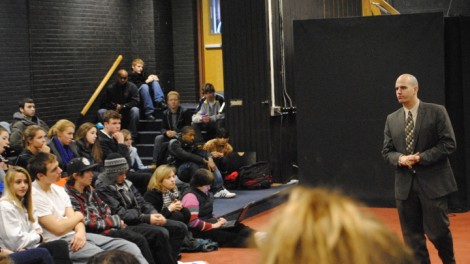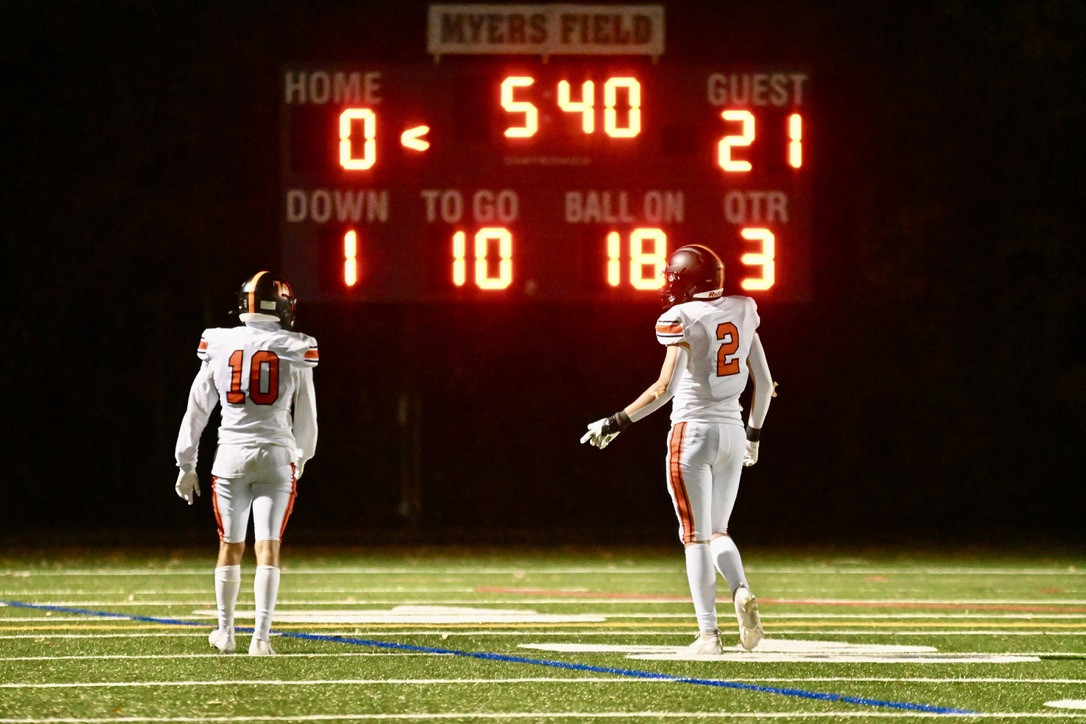
Most teens are used to having their parents nagging ad nauseum to do the right thing and make the right decisions, but last Friday, Wayland High School students heard a first-hand experience of the consequences of making the wrong decisions from the perspective of Gator Collet.
A former prisoner convicted of manslaughter, Collet relived his story by telling the group of students in L1 his regrets, remorse, and reality. He started by explaining his life as a teenager. Collet grew up as an only child and a straight-A student and soon discovered that he always wanted the attention of those around him. But Collet’s need for attention grew into an obsession.
“I was always going to make sure they were talking about me,” said Collet, even if that attention was for negative reasons. Collet’s sense of humor constantly landed him in trouble. He got kicked out of the classroom and even got suspended. But through all this, Collet’s mom constantly defended him, asking the principal to give him one more chance.
Unfortunately, Collet disregarded the chances he was given. He said that he felt he could do whatever he wanted and get away with it. In his head, there were no consequences.
Eventually Collet switched into Dartmouth High School, where he met his close friend, Nigel Thomas. Thomas’s mother had died five years before, and his step-father had been abusive, so Collet’s family took care of Thomas.
Collet wanted to be a good older brother and take Thomas wherever he wanted to go and be there for him. So when Thomas told Collet that he wanted to fight someone, Collet wanted to act as the protecting older brother and was excited at this chance to help out Thomas.
Collet drove Thomas to the bully’s house and invited his friend from his old school, Karter K. Reed, to go along with them.
Upon seeing the group, the boy called his friends for help. Outnumbered, Collet, Thomas, and Reed went home. Soon after, the boy and his friends ganged up on Thomas, leaving him beaten up.
Upon seeing this, Collet was angry with both the other boys and himself. Collet remembers thinking to himself, “You told him you were going to be there; you told him nothing would happen.”
Collet, Thomas, and Reed decided to take revenge and planned to go to the head attacker’s classroom, armed with bats and small knives. Before entering the classroom, Collet asked Thomas and Reed if they were ready, and Reed responded by saying, “Gator, I don’t want to go in, but I don’t want to leave you here.” Eventually, the trio burst through the door, only to find that their target wasn’t even in the classroom–but one of the target’s friends was.
Collet chased the attacker and before being pinned down by teachers, he managed to fling a bat in the friend’s general direction. Collet heard screaming and noticed that the class was huddled in a corner. He found out that Reed had stabbed the friend in the stomach. Collet was later told that the friend had died in an ambulance on the way to the hospital.
At their trials, Collet, Thomas, and Reed were all pronounced guilty and charged with manslaughter. Nigel Thomas, who had run away before even entering the classroom, was tried as a juvenile, Collet was sentenced to 20 years in jail, and Reed was sentenced to a lifetime in prison.
Today, Collet stressed the point that we are in control of our own decisions and that from parents and those who love us nag us to help us stay on track. Collet shared that he goes to sleep and wakes up every morning regretting his decisions. He said, “When you look in my eyes, I want every one of you to see failure, I want you to see regret.”
After hearing Collet speak, sophomore Will Curry said he came away with the message to “think things through.”
Sophomore Brigid Falvey said, “Think before you act.”
Collet began his speech by asking who thought they would be in prison, and ended by leaving the message that each decision is important and can change your life, and that “[It] takes one bad decision to stand where I am today.”
For Collet, 90 seconds was all it took to destroy his future.































